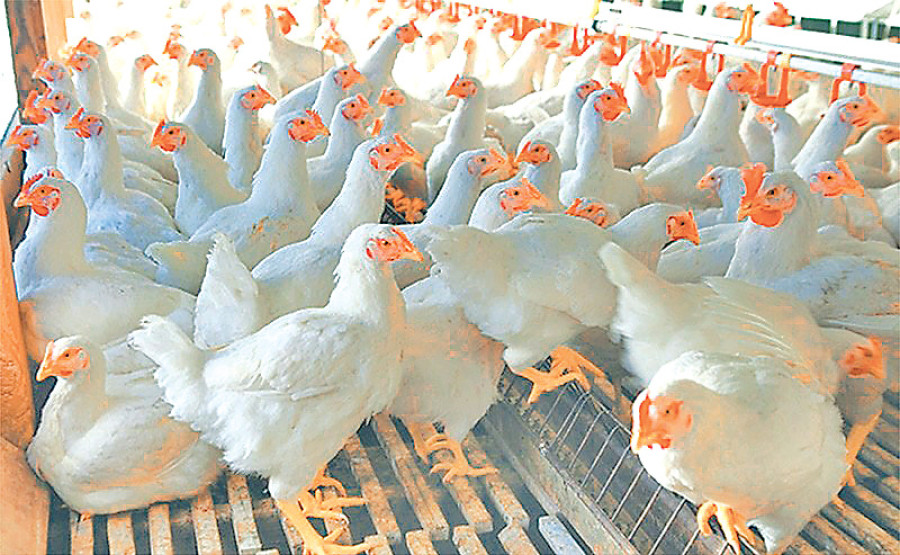National
Poultry experts show red card to Newcastle
Nepal’s poultry industry, both commercial and backyard farming, is the fastest growing sector among agriculture, but has many epidemic challenges to beat, experts warn.
Nayak Paudel
Nepal’s poultry industry, both commercial and backyard farming, is the fastest growing sector among agriculture, but has many epidemic challenges to beat, experts warn.
Poultry population has increased to 70 million by the year 2016-17 compared to 23.9 million in 2006-07.
Ministry of Agriculture and Livestock Development (MoALD) data shows 57,268 metric tons of meat and 1.3 billion chicken eggs were produced in the year 2016-17. This sector provides jobs to around 150,000 people nationwide.
During the two-day ‘Poultry Health Conference 2018’ that concluded on Tuesday in Kathmandu, animal husbandry experts advised government and private poultry sector to take precautions for the early prevention of epidemics that affects the sector every year.
The outbreak of Newcastle Disease Virus (NDV) has increased the risk of spreading to poultry farms, mostly in backyard farming. It affects layer chickens the most.
Newcastle disease is a contagious viral bird disease that affects many domestic and wild avian species. It is transmissible to humans.
The poultry disease causes respiratory diseases to very severe depression, drop in egg production, increased respiration, profuse diarrhoea followed by collapse, or long-term nervous signs (such as twisted necks), if the birds survive.
Centre for Molecular Dynamics Nepal (CMDN) and Biovac Nepal Chairman Dr Dibesh Karmacharya said, “If Newcastle disease is prevented by the backyard livestock farmers, they can increase their productivity by 25 per cent. The goal for now is to make vaccine available to all livestock farmers at an affordable cost that can prevent Newcastle disease.”
Experts suggest ND I-2 vaccine to immunise chickens from the disease as it provides a long lasting immunity to further attacks of Newcastle disease.
Nepal Agricultural Research Council animal health researcher Dr Swoyam Prakash Shrestha said, “The thermostable ND I-2 vaccine, prepared in Nepal, when tested gave protection for four months against NDV. The vaccine is practicable and affordable. A small investment in vaccine can give profitable results. Vaccines should be made by the local field isolates so that it is more effective.”
Poultry diseases affect the health of consumers as well. Experts suggest all the concerned stakeholders to vaccinate their poultry. Estimate show half of the 900 million people living below the poverty line depend on animal husbandry.
Data shows around Rs8 billion is spent on vaccines, medicines and biosecurity products of this, 80 per cent is spent on poultry.
United Nations FAO South Asia Animal Disease Specialist Dr Khadak Singh Bisht, “Around 75 per cent of recently emerging infectious diseases affecting humans is of animal origin, with South Asia being a global hotspot. Containing animal diseases at source can save lives protect livelihoods and reduce economic costs.”
Honorary Consul for Netherlands in Nepal Pepijn Trapman said, “There should be an environment where consumers can freely believe that the poultry products in the market are safe for consumption. Government has a major role to make strict policies regarding it and to ensure the health safety of the public.”
The government has also been suggested to conduct proper surveillance over poultry products as they are transferred to various places, increasing the risk of contamination and spreading various infectious diseases from birds that migrate round the world.
Department of Livestock Services Chief Livestock Officer Dr Tej Bahadur Rijal said, “From 2016, the government has taken steps to make poultry sector safe as many epidemic outbreaks have been affecting the industry and the production of quality and nutritious products. Necessary change in policies will be made to ensure safe poultry in Nepal.”
One expert advised the government to increase its concern by activities rather than words.
“Regarding scientists in Nepal to do research in livestock, we have more machines than men. Government must be able to create more manpower so that we can prepare quality vaccines,” said Dr Shrestha.




 9.7°C Kathmandu
9.7°C Kathmandu














